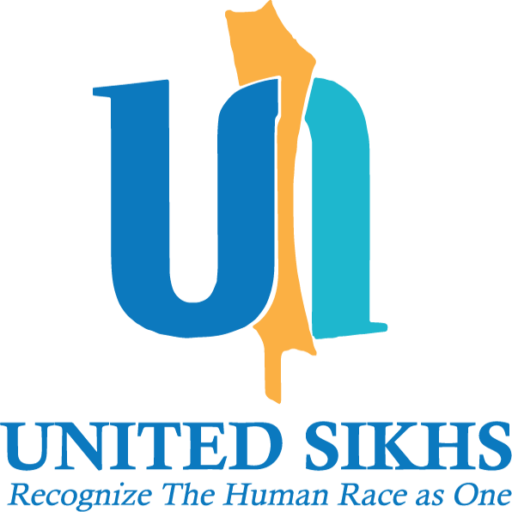UNITED SIKHS reminds UN NGO’s of the importance of advocacy through religious influences on human rights

New York City, New York: In observance of International Human Rights Day, UNITED SIKHS and other non-governmental organisations participated in the seminar ‘Greatness Was and Can Be Again’ at the UN Church Center in New York City on December 7th, to discuss lessons that can be learned about the religious (in) fluences on human rights and religious freedom. UNITED SIKHS’ contribution was led by Dr Muninder Kaur, who spoke about the Zafarnaamah, the Epistle of Victory written by Guru Gobind Singh Ji, the tenth Guru of the Sikhs.
The event was co-sponsored by the NGO Committee on Human-Rights, the Committee of Religious NGOs, the NGO Committee on Religious Freedom and Belief, and the United Methodist Church’s Women’s Division through the Office of the Chaplain, and aimed to celebrate human rights and recognise the importance of religious influences on the rights that are today established in various human rights documents across the globe.
Summaries of the speeches that were made can be seen below:
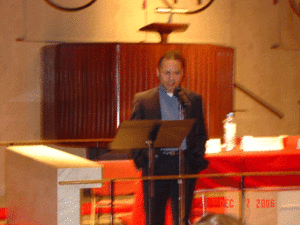 1. Mr. Cyrus Kar (film-maker and Founder, Spenta Productions)
1. Mr. Cyrus Kar (film-maker and Founder, Spenta Productions)
‘The Edict of Cyrus’ (548 BCE, Persian Empire).
Film-maker Mr Cyrus Kar, explained as to how Cyrus the Great king of Persia , 580-529 BC, who founded Persia by uniting the two original Iranian Tribes- the Medes and the Persians. Although he was known to be a great conqueror, who at one point controlled one of the greatest Empires ever seen, he is best remembered for his unprecedented tolerance and magnanimous attitude towards those he defeated. He issued the decree of liberation to the Jews and the edict of Cyrus for the rebuilding of the Second Temple at Jerusalem marked a great epoch in the history of the Jewish people. Cyrus’s magnanimity to diverse beliefs and customs of peoples within his extended kingdom is enshrined in the UN Charter.
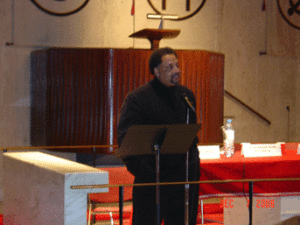 2. Mr. Ibrahim Ramey, The Muslim American Society Freedom Foundation.
2. Mr. Ibrahim Ramey, The Muslim American Society Freedom Foundation.
Cordoba , Spain (711-1492).
Mr. Ibrahim Ramey from The Muslim American Society Freedom Foundation, spoke about Islamic Spain (711-1492). Its society was a multi-cultural mix of the people of three monotheistic religions: Muslims or the moors, Christians, and Jews. He discussed about the Golden age of the Islamic rule in this era and also discussed the complicated position of the non-Muslims under the various Muslim rulers of Spain . He also discussed the cultural alliances, particularly in the architecture – the 12 lions in the court of Alhambra are heralds of Christian influences. A great degree of civilisation was brought to Europe that matched the heights of the Roman Empire and the Italian Renaissance.
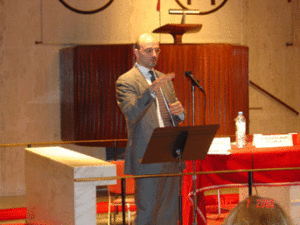 3. Mr. Shamil Idriss, Acting Director, Alliance of Civilizations.
3. Mr. Shamil Idriss, Acting Director, Alliance of Civilizations.
‘ Alliance of Civilizations’ (21 st Century).
Mr. Shamil Idriss, Acting Director, Alliance of Civilizations gist of the conversation was to look at tyrannical history in the light of the empirical rulers and to not link any religion with violence and create an environment of racism by blaming a particular religion.
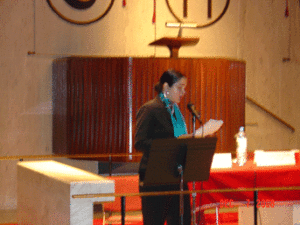
4. Dr. Muninder Kaur (UNITED SIKHS, Director of Empowerment and Education; Asstt. Prof., Counselling Programs Department, Montclair State University ; Vice-Pres. Of the University Senate).
‘The Zafarnaamah’ (1705: Epistle of Victory, issued by The Sikh Guru against the Mughal Empire).
Dr. Muninder Kaur, Director of UNITED SIKHS, Empowerment and Education program and Assistant Professor at Montclair State University spoke on the Zafarnaamah, written by the 10 th Guru Gobind Singh in Persian. It has 111 verses. 34 verses were in praise of God. 22 verses describe the events in the Battle of Chamkaur,- in Ropar district of the Punjab , the heroism of both Mughal and Sikh soldiers there as well as the cowardice of some. 6 verses praise Abu Muzaffar Muhiuddin Muhammad Aurangzeb Alamgir – ruler of the Mughal Empire from 1658 until 1707 , while 15 verses admonish him for breaking the oath to the Guru given by him and his agents; 32 verses address Aurangzeb’s invitation to meet the Guru, the Guru’s refusal because of Auragzeb’s broken oath and the Guru’s communication to the effect Aurangzeb come to meet him in the spirit of forgiveness, friendship and peace; and finally; 2 verses warn Aurangzeb about the resolve of the Khalsa, Sikh saint-soldiers, not to rest until the tyranny has ended and his oppressive empire is destroyed.
Dr. Muninder Kaur referred to one of the most quoted verses of the Zafarnaamah, “When all the stratagem employed for (solving) a problem are exhausted, (only) then taking your hand to the sword is legitimate.” She added: “Thus, Guru Gobind Singh Ji stated that even when persecution and oppression occur, a person or nation should go to battle against another only as a last resort. This declaration was to be enshrined 241 years later in the Charter of United Nations that states: “ to ensure, by the acceptance of principles and the institution of methods, that armed force shall not be used, save in the common interest, ….”
Verse 22 is reproduced below in its English Version
Chun Kar Az Hameh Heelat-E Dar Guzasht
Halal Ast Burdan B-Shamshir Dast
She also discussed the Article 3 of the UN Charter which sets the base for all political and ciivil liberties, including freedom from slavery, torture and arbitrary arrest, as well as the rights to a fair trial, free speech and free movement and privacy and how it is reflected in verse 65 of the Zafarnaamah where the Guru says
Tu Bayed Ke Yadzan Shanaasi Kuni
Na Gufte Kas-E Kas Kharaashi Kuni harm people
As a ruler and a statesman you should believe in the Lord Almighty;
stop harming people on the advise of your courtiers
Verse 11, of the Zafarnaamah was elaborated in which the Guru says,
Ke O Be-Mohabaa-St Shahane-Shah
Zameen O Zameen Ra SACHA PATSHAAH
God is free from fear. He is the emperor of the universe and true sovereign.
Implying G od is free from fear and is the emperor of the universe and true soveriegn. Hence by implication, since all people are created in the image of God, and are hence, sovereign and have inalienable rights and inherent dignity. This is sharply reflected in the UN preables of the Universal Declaration of Human Rights, adopted in 1948 and is stated as
…
Whereas recognition of the inherent dignity and of the equal and inalienable rights of all members of the human family is the foundation of freedom, justice and peace in the world,
Dr. Michael Gordon introduced musical performers, and the presentations were made by:
- Deborah Nodel Gordon, Peter Couchman and Diana Solomon-Glover
“Most Wondrous Is Man – A Law Above”: Composed by Deborah Nodel Gordon. - Diana Solomon-Glover
“I don’t feel no ways tired”: Arranged by Jacquline B. Hairston. - Drumming by ‘Sanga Of The Valley’
UNITED SIKHS through their Multifaith Directorate continues to strive to engage in meaningful dialogue through seminars and workshops with diverse races, religions, cultures and traditions, in an environment of openness, trust and equality and will keep the community updated on its Multifaith activities.
Issued by:
Amarjit Singh
UNITED SIKHS Operations Manager
amarjit.singh@unitedsikhs.org
Tel: (1) 888 243 1690

